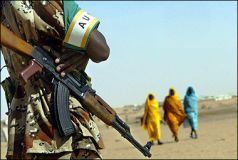Darfur peace talks must address civilian protection: HRW
NEW YORK, Dec 10, 2004 (HRW) — The African Union must speed its deployment of troops to Darfur and seek to expand their mandate to protect civilians, Human Rights Watch said today in a letter to Nigerian President Olusegun Obasanjo, the current AU chairman. Any accord between the Sudanese government and Darfur rebel groups, set to resume peace talks on Friday in the Nigerian capital Abuja, needs to incorporate human rights provisions.

|
|
Displaced women walk in front of a Rwandan soldier belonging to the African Union Force and patrolling a section of the Abu Shouk displaced camp on the outskirts of El-Fasher, Sudan.(AFP). |
Civilians in the rural areas of Darfur far from the African Union’s existing bases continue to come under attack, as Sudanese government forces and their Janjaweed militias pursue a campaign designed to consolidate ethnic cleansing and prevent farmers from returning to self-sufficiency. The African Union should ask the United Nations Security Council for a full mandate to protect civilians. Human Rights Watch also called on the African Union to rapidly deploy its expanded monitoring force of 3,500 personnel in Darfur and press for more help from the international community to achieve this.
“The African Union still has only 900 troops and monitors on the ground in Darfur, and these forces lack the mandate to protect the hundreds of thousands of civilians who remain at risk of attack,” said Peter Takirambudde, Africa director at Human Rights Watch. “They need to secure the rural areas of Darfur as quickly as possible so that 1.8 million people can return home safely and voluntarily.”
While the Sudanese government resumes African Union-mediated talks in Abuja with two Darfur rebel groups, it also faces a U.N. Security Council deadline of December 31 to finalize the Naivasha accords with the southern rebel movement to end the 21-year civil war. The failure of the Naivasha accords to include accountability provisions for crimes committed during that war, waged mostly in the south, has ensured that the Sudanese political and military leadership responsible for those atrocities would remain immune from punishment, further fueling their abuses in Darfur, Human Rights Watch said.
“Once again, the Sudanese government has armed and directed ethnic militias to carry out the same scorched-earth tactics of mass displacement in Darfur that it so ruthlessly employed in the south,” said Takirambudde. “Unless the international community ensures that the Sudanese authorities are held responsible for these crimes in Darfur, their atrocities will continue.”
The Sudanese government has continued to use helicopter gunships and Antonov airplanes in attacks against civilians in Darfur and has failed to take any steps to “neutralize and disarm the Janjaweed/armed militias,” in violation of a Security Protocol signed between Khartoum and two Darfurian rebel groups on November 9. Meanwhile, the rebels as well as the government have repeatedly broken the AU-mediated ceasefire with minimal consequences.
In view of the Sudan government’s failure to abide by African Union and Security Council resolutions to disarm and prosecute the Janjaweed militias, and its refusal to end its support for their rampages and protect civilians instead, Human Rights Watch called on President Obasanjo to recommend depriving Sudan of its voting rights in the African Union. The African Union should also reverse its decision to hold its 5th Assembly of Heads of State and Government in Khartoum in July 2005, and thus also prevent Sudan from assuming the presidency of this important emerging regional body for one year.
“The African Union must demonstrate that it will not tolerate Khartoum’s continued disregard for the principles and ideals on which the African Union was founded,” said Takirambudde. “The fate of Darfur’s people is at stake, and so is the credibility of the African Union.”
